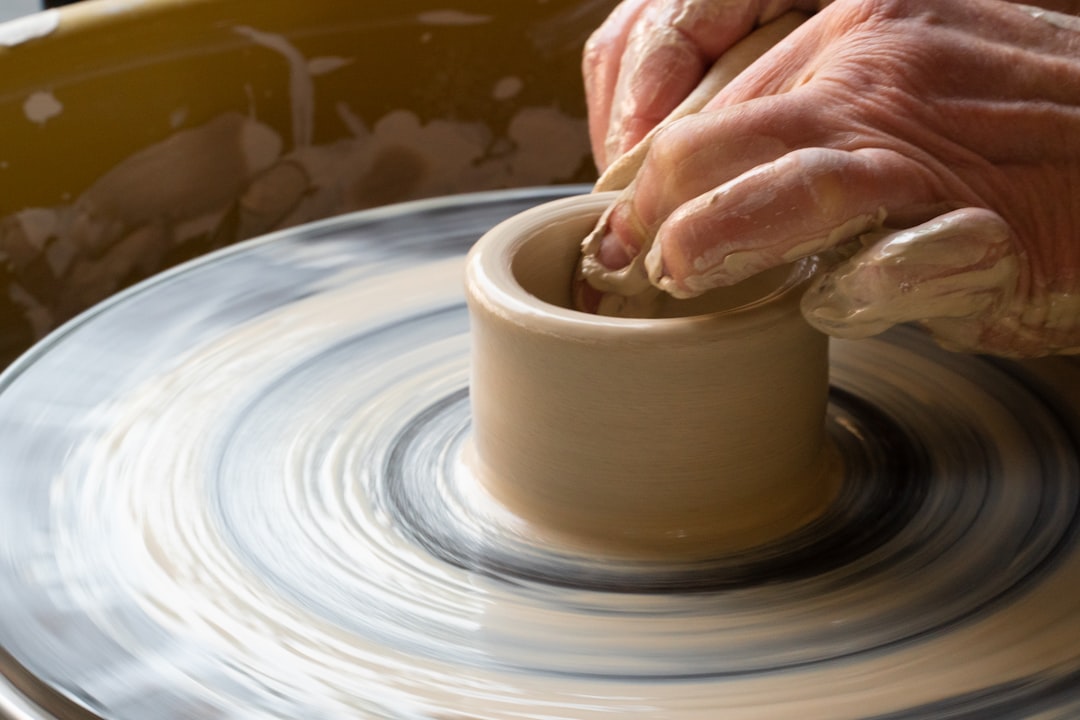Poets Watching TV: The Great Pottery Throw Down Is Hypnotic & Surprisingly Emotional
Can it help you fall under the spell of your own work again?

There was a phase in my life as a young poet where emotion seemed downright embarrassing. Wild, right? That art—you know, the human creation whose purpose is to instruct, inspire, and move us—could function with a foundation in human emotion seems ludicrous to me now. But particularly in the NYC scene I found myself in during my MFA, it seemed as if intellect, hipness, and mystery were to be prized above all else. Sometimes folks fought back, but it felt risky.
“Paul Violi told me that sentimentality is a risk worth taking,” a poet in my cohort proudly announced to a group of us one evening, cigarette perched between her fingers. I think I went so far as to laugh. The young writer I was then, nearly 15 years ago, is almost unrecognizable to me now.
In poetry, and in all the art I consume, I relish emotion. Strong displays don’t scare me: they make me feel alive, and connect me to my own humanity. Is it the same for you? I remember watching Fatimah Asghar read “If They Should Come for Us” at Busboys & Poets at AWP DC in 2017, pounding her chest with the flat of her hand, her voice edged with trembling emotion as she read the poem’s final lines:
my people my people the long years we’ve survived the long years yet to come I see you map my sky the light your lantern long ahead & I follow I follow
Art that presses us up against the raw power of the emotion feels like an encounter with the divine. And sometimes that moves us to tears.
The Poetry Game and The Great Pottery Throw Down
Pottery and poetry: just one letter separates them And yet no one ever questions the utility of a beautifully made ceramic bowl.

When I read Jehanne Dubrow’s tweet about the HBO Max show The Great Pottery Throw Down this spring, the show was already on my list to write about for PopPoetry. I knew it would likely offer solid material for meditating on creativity, but the genuine tears of judge Keith Brymer Jones were a welcome surprise, as Dubrow notes.
The Great Pottery Throw Down is soothing British process television in the vein of The Great British Bake Off, and like GBBO, stars judges who are stars of their respective creative worlds. Known for his displays of emotion, Brymer Jones is, interestingly enough, also known for his so-called “word range” of pottery: ceramic items featuring delicate letters stamped into them. Some are straightforward, and others are delightfully… what’s the term? Cheeky.
Brymer Jones is dyslexic, and has said that his condition, which he doesn’t view as a disability, gives him “a greater affinity with shape, form, and volume.” And so it was the shape of words, rather than their mere signification, that interested him and led him to use them in his pottery. Compilations of Brymer Jones crying are plentiful, and bring me damn near to tears just reviewing them.
Brymer Jones’ strong feelings remind us of art’s power and make the show even more interesting to watch. One could say that it’s much more interesting to watch a potter throw a vase than it is to watch a poet write—mainly because writing sometimes looks like staring at the wall behind your desk while you absentmindedly crunch through an entire bag of baby carrots without writing a word.
But the visuality of pottery making provides us with beautifully apt metaphors for the creative process writ large. We start with a hunk of raw material (language) and an idea. Slowly we shape that material into something full of beauty, meaning, and even usefulness. And sometimes we fuck it up. But that just makes our successes more astounding.

If you’re playing the Poetry Game while watching The Great Pottery Throw Down, and if you’re a longtime reader of PopPoetry, I’m betting you are, you’ll find it very easy to pretend that the craft discussions, creative victories, and structural failures the potters discuss on the show to be easily portable to the craft of poetry in your mind.
There are lots of great nuggets to tuck away for later, pretending the potters are poets doling out advice for your next sonnet:
“I find that the simpler the design the more impact it has.” (Season 1, Episode 1)
“When you throw [first create] a pot, you’ve got it to a point. But turning [refining] a pot, you can discover its character.” (Season 2, Episode 3)
“Take your time. Let the clay come with you.” (Season 3, Episode 7)
“I knew something like this could happen. But I figured I need to take the risk anyway.” (Season 4, Episode 2)
“A former [or a form] will help support their base until the clay is dry enough to take its own weight” (Season 5, Episode 10)
What would it mean to take one of these creative epithets and let it guide your next poem or project?
The Great Pottery Throw Down is streaming on HBO Max in the United States, and a sixth season is rumored to be on deck for 2023. Happy watching, poets and creatives! If you’ve already watched, I’d be interested to know what you enjoy about it, whether you’ve intuited anything about the creative process more broadly from it, and whether you find yourself getting choked up over ceramic clocks, too.



